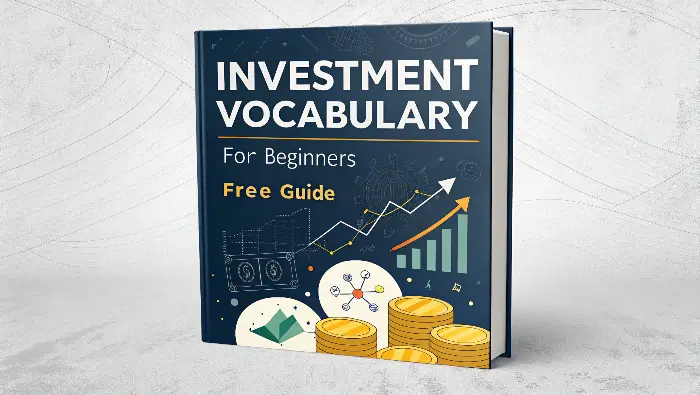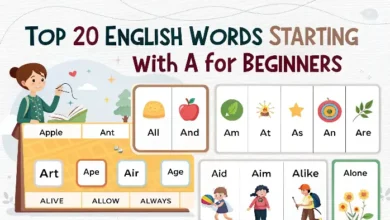Investment Vocabulary for Beginners – Free Guide

Investment Vocabulary for Beginners – Free Guide
If you’re new to investing, the financial world can feel confusing. Words like diversification, capital gains, and mutual funds might sound intimidating. But understanding these basic investment terms is the first step toward building real wealth and making smart financial decisions.
This beginner’s guide introduces 20 essential terms you must know before you start investing. Whether you’re interested in the stock market, real estate, cryptocurrency, or just looking to earn passive income, this guide is made for you.
Why Learning Investment Vocabulary Matters
Before you invest a single dollar, you need to understand how investing works. Knowing the right terms can help you:
- Choose the best investment portfolio
- Reduce risk and increase potential returns
- Understand how compound interest works
- Avoid scams and bad advice
- Build financial literacy and long-term wealth
Even if you’re working with a financial advisor, you still need to know the basics so you can ask the right questions and make informed decisions.
Investment Vocabulary for Beginners – Free Guide
Top 20 Investment Terms You Should Know
| Term | Simple Definition | Example Sentence |
|---|---|---|
Investment | Putting money into something with the goal of earning a return | I made an investment in a mutual fund. |
Return on Investment (ROI) | The profit made from an investment | My ROI was 10% last year. |
Risk | The chance of losing money on an investment | Stocks carry more risk than savings accounts. |
Stock | A share in the ownership of a company | I bought shares of Apple stock. |
Bond | A loan you give to a company or government that pays interest | Government bonds are seen as low-risk investments. |
Mutual Fund | A pool of money from many investors managed by professionals | I invested in a mutual fund for long-term growth. |
ETF (Exchange-Traded Fund) | A type of fund traded like a stock | ETFs are good for beginners due to low fees. |
Diversification | Spreading investments across assets to reduce risk | Diversification helps protect my money. |
Portfolio | A collection of investments | My portfolio includes stocks, bonds, and real estate. |
Capital Gains | The profit from selling an investment | I paid taxes on my capital gains after selling stocks. |
Dividends | Profits shared with stockholders | I receive quarterly dividends from my investments. |
Compound Interest | Earning interest on both the money you save and the interest itself | Compound interest helps money grow faster. |
Asset | Anything of value that can be owned | Real estate is a valuable asset. |
Liability | Money you owe | Paying off liabilities is key to financial health. |
Cryptocurrency | A digital currency used for online transactions and investments | I invested in Bitcoin and Ethereum. |
Real Estate Investment | Buying property to earn income or profits | Real estate investment can provide stable cash flow. |
Liquidity | How easily an investment can be converted to cash | Stocks have more liquidity than property. |
Bull Market | A market where prices are rising | Investors love a strong bull market. |
Bear Market | A market where prices are falling | Many avoid investing during a bear market. |
Financial Advisor | A professional who helps you plan your investments | I consulted a financial advisor before investing. |
Investment Vocabulary for Beginners – Free Guide
Smart Investment Vocabulary for Beginners: Learn & Apply
Before you invest your money, it’s important to understand the language of finance. Below are some educational keywords that you will often hear when talking about investments, especially in areas like real estate, crypto trading, and stock market analysis.
Here are 5 additional key terms explained simply:
| Term | Definition | Example Sentence |
|---|---|---|
| Passive Income | Money earned with little or no effort on a regular basis | I earn passive income from rental properties. |
| Investment Strategy | A plan for how to invest money to meet financial goals | My investment strategy focuses on long-term growth. |
| Asset Allocation | Dividing your money among different types of investments | Asset allocation helps balance risk and reward in my portfolio. |
| High-Yield Investment | An investment that promises higher returns, often with higher risk | Cryptocurrency is considered a high-yield investment by some. |
| Financial Independence | The ability to live without relying on employment income | My goal is to achieve financial independence by age 40. |
These terms are commonly searched by users interested in:
- how to start investing
- build passive income online
- crypto vs real estate investing
- safe high-yield investment options
- long-term investment strategies for beginners
Understanding these will boost your confidence and help you take smarter financial steps, especially if you’re using online trading platforms or working with a financial advisor.
Mini Quiz – Test Your Knowledge

Question 1:
What is the term for profits made from selling an investment?
A. ROI
B. Capital Gains
C. Dividends
D. Interest
Correct Answer: B. Capital Gains
Question 2:
Which of these helps reduce investment risk?
A. Putting all your money in one stock
B. Avoiding investment altogether
C. Diversification
D. Paying off debt
Correct Answer: C. Diversification
Question 3:
Which term means earning profits from company shares regularly?
A. Capital gains
B. Liquidity
C. Dividends
D. ROI
Correct Answer: C. Dividends
Practice Activity – Fill in the Blanks
Use these words: mutual fund, portfolio, asset, ROI, real estate
- I built a strong investment __________ with stocks and bonds.
- The __________ from my investment this year was 12%.
- A house is considered a valuable __________.
- I invested in a __________ managed by professionals.
- I’m exploring __________ investment for passive income.
Answers:
- portfolio
- ROI
- asset
- mutual fund
- real estate
Download the Free PDF Version
Want to keep this guide for offline reading and future reference?
Download the full PDF version with all terms, definitions, examples, and practice quizzes.
Conclusion
Investing doesn’t have to be complicated. Once you understand the basic vocabulary, you can start making informed decisions, reduce your risk, and grow your money. Whether you’re investing in stocks, mutual funds, or real estate, these 20 terms will help you build a strong foundation for financial success.
- Learn English Online for Free: 20+ Powerful B-Words for Beginners
- Top 20 English Words Starting with A for Beginners
- Top 25 English Words Starting with C
- Legal English for Beginners – Learn Legal Terms Easily
- English Conversation About Personal Loans
- Banking & Insurance Vocabulary for Beginners








Je suis débutant en anglais. J’aimerai avoir le cours depuis le niveau débutant. Merci
Great